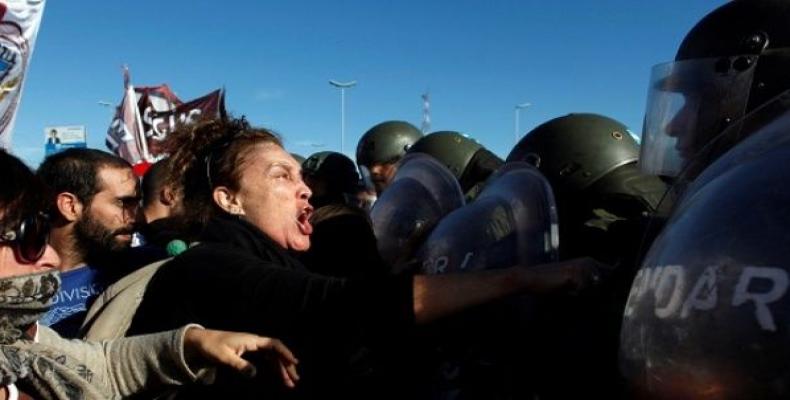Buenos Aires, April 7 (RHC)-- Riot police violently clashed with demonstrators Thursday during a national strike that brought Buenos Aires to a standstill as the region's political and economic elites kick off the Latin American edition of the World Economic Forum in the Argentine capital.
This is the first nationwide general strike since right-wing Presdient Mauricio Macri took office, and was called to protest his government's austerity and neoliberal shock therapy on the economy. Hundreds of protesters blocked the Panamerican Highway, one of the main entrances to the capital city of Buenos Aires, and were violently evicted by police with tear gas and water canons. At least xix people have been arrested and four injured so far.
As several organizations and unions support the strike, national and international flights were canceled as well as public transportation during the 24-hour general strike, bringing a halt activities in health, education, manufacturing, banking, garbage collection, and even some government offices. and public administration as well.
"The stoppage is a success. It has demonstrated across the country the discontent with the government's economic policies," said Carlos Acuna, leader of the General Confederation of Labor, which called for the strike.
"We are questioning the economic path the government is pursuing. Our responsibility is to expose social unrest to the table," Juan Carlos Schmid, a fellow member of the labor confederation told Radio Miter. "More jobs were destroyed than they were created and the cost fell on employees and vulnerable sectors."
Unions and supporters are demanding wage hikes, job creation, and more opportunities for small and medium-sized enterprises in Argentina. They are protesting double-digit inflation, rising basic commodity products, cuts to services, and mass layoffs.
The protests is done on the same day as Macri hosts the first World Economic Forum, in the high-class neighborhood of Puerto Madero in Buenos Aires. The event brings together politicians, bankers, businessmen, think tanks, NGOs, and representatives of other governments.
Last week, the government called on citizens to not adhere to the march and President Macri criticized the unions calling to strike, even accusing them of “mafia-like behavior” and vowing to fight them.


